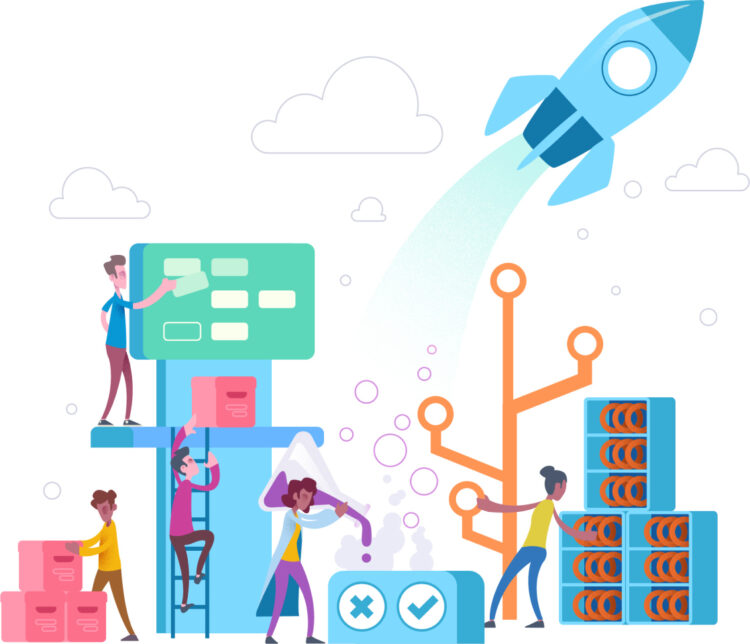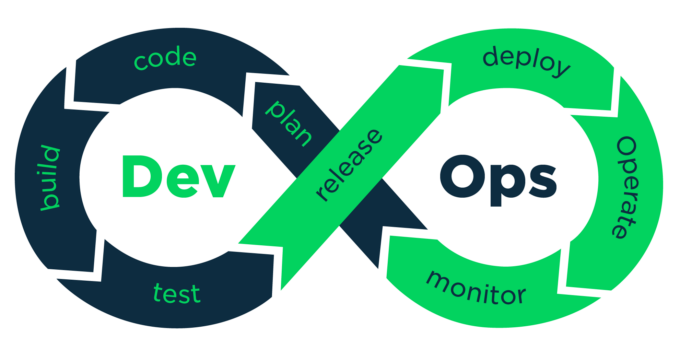DevOps is a set of practices that combines software development and IT operations. It is a system development life cycle methodology (SDLC) designed to speed up product release cycle, reduce waste processes and improve end-user experience with every release iteration. In addition to the tools and processes that enable DevOps, the methodology is largely focused on culture, the people and their mindset. DevOps services help in optimizing the cost, agility and scalability of your IT ecosystem.
To read more about DevOps services, click here.
In DevOps organizations, small, multidisciplinary and autonomous teams work together across the development, QA and operations departments with shared responsibilities. Teams are required to focus on product quality and speed of delivery through collaborative efforts, automation and response to feedback from all the stakeholders. DevOps aims to reduce bottlenecks within collaborating teams through effective automation. Despite the available technologies and process workflows in place, teams may face conflicting goals and may not be able to realize the true pace of DevOps if a cultural change is not adopted. One of the most challenging aspects of a DevOps transformation isn’t automating and
overhauling technology, the biggest challenge and one of the most important aspect of DevOps is
changing the organization’s culture and purpose, because apparently, an organization cannot
“buy DevOps”. DevOps is more than a job title or team of resources; it is culture of constant
innovation. Implementation and execution of DevOps as an approach demands the involvement of
people, process and tools working together. DevOps enables you to innovate, learn and improve
to drive your business forward.
DevOps Culture

Source: mobilelive.ca
DevOps culture is all about a shared understanding between developers and operations, and sharing responsibility for the software they build. This implies increasing transparency, communication, and collaboration across development and IT/operations.
Developing a true DevOps culture at the workplace requires teams to redefine their responsibilities, adopt proactive measures to reduce problems rising due to the workplace culture and adapting cultural performance on a continuous retrospective analysis.
DevOps culture blurs the lines between the roles of Devs, Ops and QA. The philosophy of continuous improvement with DevOps is exercised by working toward frequent but small software changes with every build iteration, carefully tested with automated tools and released to end-users at a faster pace. Response from end-users and stakeholders allow developers to adjust the SDLC pipeline continuously for improved outcomes. These improvements are inherently customer-driven and focus on improving end-user experience with every release.

Source: atlassian.com
The preliminary starting point of the transition is the mindset for the implementation of DevOps which is to be transparent and be able to trust each other in the team. Further to adopt non-conflicting goals, embrace failures and follow a shared sense of responsibility in the organization.
From an organizational standpoint, enabling true autonomy among individuals and DevOps team members and facilitating cross-functional collaboration to reduce waste and bottleneck processes and adopt continuous flows across the SDLC pipeline.
Every organization who is on their way to implement DevOps as a culture should consider the following aspects for a seamless transition:
- Upgrade your toolset: To achieve positive outcomes in DevOps, the organization should have an extended and improved toolset. In DevOps, the process to create small and isolated environments instantly, the organization has to become completely automated. The system should be able to operate, test, build and deploy the systems.
- Efficient & transparent communication: While making an organizational shift to DevOps, one of the most important things to get right is to have efficient and transparent communication throughout the team and the organization. There should be collaboration and communication between the development and operations teams to get the best outcomes from DevOps.
- Change Management: Cultural changes don’t happen overnight in any team/organization. It needs to be initiated from the top and implemented to the smallest unit of the team. Successful transitions are usually a continuous journey.

Source: microsoft.com
- Continuous Learning: In the beginning, there might be high chances of things not going smoothly. With a positive approach, situations could be handled and turned around in the organization’s favor. One of the learnings which would help the organization in the longer run is to learn from their failures around implementing DevOps.
- Upgrading the Process: One of the most important aspects of any transition in an organization is to evolve and enhance its processes, to make it more efficient and logical. While transitioning to DevOps culture, it is important to automate the majority of the processes from the unit level to the infrastructure level.
- Focus on Automation: To strive for continuous improvement and the ability to respond to customer feedback immediately, organizations should focus on building its automation capabilities. Automating the repetitive tasks and routine activities will help the teams to get extra time which could be utilized more efficiently, improving the overall performance of the organization.
- Improvement through testing: To further refine the speed and quality of the processes, the organization should develop the testing techniques of the system. Continuous testing would lead to increase in the accuracy for the team. The organization should be on the lookout for improvements in process, in quality and in speed. It requires a change in the mindset to “Lets see how it works and continue to iterate”. Moving ahead with this cultural change, it requires flexible systems and ways of working to identify issues as well as opportunities, quick adjustments and continuous testing.
Even though a sudden cultural shift is not possible for most organizations, starting off small and expanding the cultural approach across multiple DevOps teams is a viable starting point. These characteristics improve the odds of success of any DevOps and agile transformation. Successful large scale changes start small and sets the organization on the path to achieving the vision.





